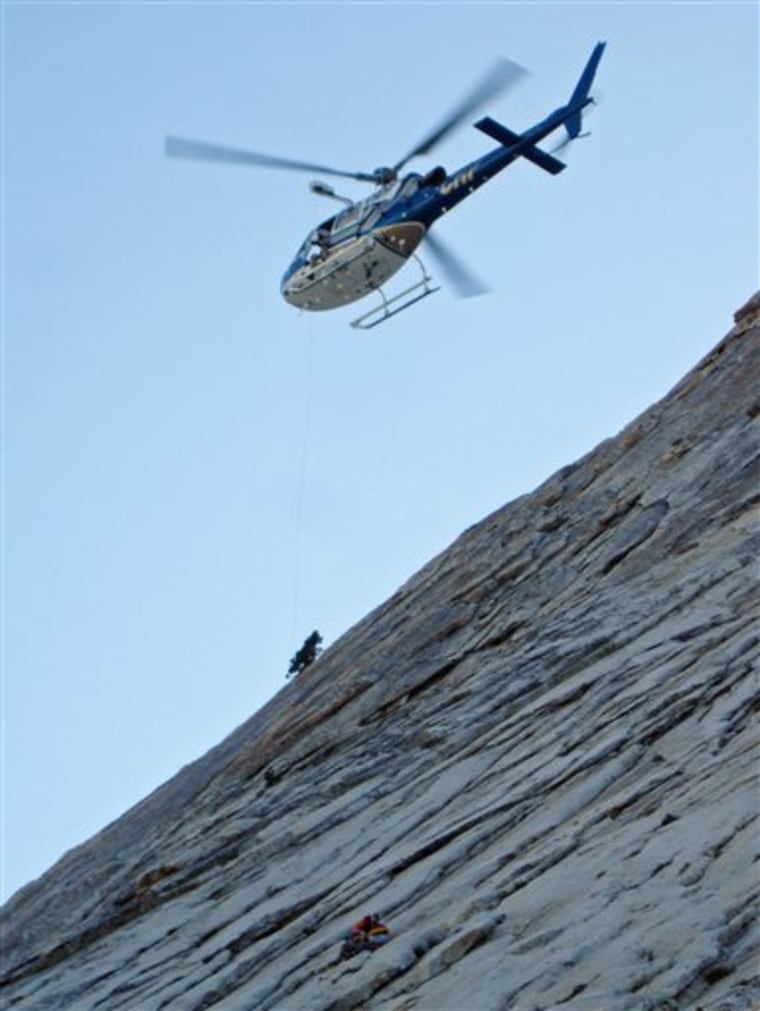As Lawrence Bishop lay battered, bruised and weakened from two days without food or water, clinging to a narrow ledge of slick granite high in the Sierra Nevada, Deputy David Rippe made a split-second decision that likely saved him.
Without ropes, Rippe scrambled 300 feet up a 70-degree slope of granite to secure Bishop with nylon webbing he happened to have in his pocket.
"I knew I had to get there quickly and safely," Rippe, a member of the Fresno County Sheriff's Office Search and Rescue Team, said Wednesday. "He looked like he was going to fall at any moment, and I was just hoping I could get there before he did."
Saturday's dramatic rescue was completed when a high-altitude Highway Patrol helicopter hoisted Bishop off the 10,295-foot peak, capping a 24-hour search for the 64-year-old man, who had become separated from his group nearly two days earlier.
Bishop, a retired hazardous waste specialist from the Santa Barbara County Fire Department, told rescuers he had tried to descend the dome of granite in Dinky Lakes Wilderness 45 miles northeast of Fresno after he summited Dog Tooth Peak on Thursday then chose what turned out to be a hazardous route down.
Hallucinating about being rescued
He fell three times, cutting his head and scraping up his body, and stayed up all night trying to keep his balance before he realized midday Friday he couldn't make it. He found a six-to-seven-inch wide ledge about 150 yards from the bottom and wedged his body there while he hallucinated about being rescued.
"I was planted there until someone found me or I was going to die there," Bishop said Wednesday.
He had started slipping down the rock on Saturday as his delirium increased and his strength faltered on Saturday when he spotted what looked like a group of people standing below him.
"I was kind of on my last foothold holding on," Bishop recalled. "I saw some orange suits and got this burst of adrenalin. I instantly sturdied my foot, I sturdied my hand and I yelled, 'Help me!' as loud as I could."
The folks in orange were members of the sheriff's volunteer search and rescue team who were walking a grid looking for any sign of Bishop, whose backpack had been located earlier in the day at the top of the peak.
Bishop let out a moan. Rippe thought he heard him.
"I turned to another deputy and said, 'did you hear that?'" Rippe said.
Deputy Greg Villanueva said he thought he had heard something too, just as a helicopter passed overhead.
'He saved my life'
The deputies waved off the chopper and listened again. Villanueva quickly spotted Bishop, his dark shirt and pants blending into the side of the mountain.
"He looked like he was just about ready to fall," said Rippe, who yelled: "'Don't move, we're coming to get you.'"
The rest of the astonished team watched as Rippe scrambled up the side of the granite slope.
Russ Richardson, head of the volunteer search crew, said Rippe's climb without rope or other equipment was "stressful and amazing."
When he reached Bishop, Rippe put his hand on his shoulder then looped the 20-foot section of webbing between the man's legs and over a narrow section of rock.
Standard procedure is to have a helicopter lower a "screamer suit," sort of a full-body sling in which injured people can be loaded and then hoisted to safety. But with no room to work, Rippe told Bishop his only option was a less secure cinch collar, which fits under a person's arms like a life preserver. With legs dangling, Bishop was hoisted by the helicopter to safety.
"When they touched me, I kind of collapsed," Bishop said. "He saved my life."
Rippe's main duty is investigating Internet sex crimes against children. He said the danger he defied while scaling the granite promontory didn't frighten him until he thought about it later.
"At the time I was fine, but afterward is another story," he said. "When I was up there I looked down and saw where I had gone and it looked a lot different to me than it did in the beginning. It really made me stop and think."
More content from NBCNews.com:
- 50 percent of US counties deemed 'natural disaster areas'
- Antiques dealer double-crossed investigators to get valuable rhino horns
- Video: Chick-fil-A ignites culture wars
- Colleges freeze, reduce tuition as public balks at further price hikes
- From combat to corporate — and the new stigma blocking some veterans
Follow US News from NBCNews.com on and
